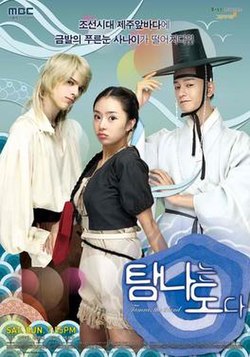Tamra, the Island
| Tamra, the Island | |
|---|---|
 |
|
| Also known as |
|
| Based on |
Tamra, the Island by Jung Hye-na |
| Written by |
|
| Directed by |
|
| Starring |
|
| Country of origin | South Korea |
| Original language(s) | Korean |
| No. of episodes | 20 |
| Production company(s) | Group Eight Hunus Entertainment |
| Release | |
| Original network | Munhwa Broadcasting Corporation |
| Original release | August 8 – September 27, 2009 |
| External links | |
| Website | |
Tamra, the Island (Hangul: 탐나는도다; RR: Tamnaneun Doda) is a 2009 South Korean television series starring Seo Woo, Im Joo-hwan and Pierre Deporte. It aired on MBC from August 8 to September 27, 2009 on Saturdays and Sundays at 19:55 for 20 episodes.
It is a historical drama set in the 17th century during the European colonial expansion into the Far East. Themes of racial tension and xenophobia, social inequality, and rumination on the effect of foreign policy and international trade on the quotidien are prevalent throughout the series; however, the romantic comedy aspect remains at the forefront for the majority of the narrative.
William J. Spencer (Pierre Deporte) is a young British in the year 1640 with a fascination for East Asian art, languages, and culture. He counts as his closest friend the young somewhat mercenary Japanese merchantman Yan. William is swindled by a shady merchant into believing that a plain porcelain chamber pot is a mystical artifact; he then sails off to Nagasaki in order to open the "aquatic silk road" between Japan and England, but mostly to escape his creepy and overbearing mother and an arranged marriage. Yan is promised a handsome reward if he can drag her son back in time for the wedding and hightails it after his "friend."
Meanwhile, the Joseon Empire is operating under a foreign policy that strictly prohibits trade with Westerners, garnering the nickname "the hermit kingdom." Just south of the Korean mainland lies the island of Jeju, which at this point in history is known as Tamra. The people who live on the island derive their livelihoods by diving for abalone, cultivating a large area of persimmon orchards, and basic subsistence farming; much of what they produce is tithed to the King through a corrupt local government.
...
Wikipedia
